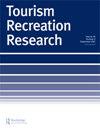生态服务质量对游客参与行为的影响:生态意识、生态活动学习与S-O-R理论
IF 3.4
Q1 HOSPITALITY, LEISURE, SPORT & TOURISM
引用次数: 0
摘要
摘要本研究旨在探讨生态意识和基于生态活动的学习在生态服务质量模型中日益增长的作用及其对生态旅游地游客参与行为的影响。基于对在线旅游评论的回归和FsQCA分析,结果表明生态服务质量对游客满意度有显著影响,进而导致他们在重访、推荐和学习参与方面的参与行为。有趣的是,结果显示游客的生态意识显著地刺激了他们在生态旅游目的地的重访参与。此外,基于生态活动的学习也显著调节了生态有形维度(生态环境或酒店提供的对环境安全无害的物理设施)与游客满意度之间的关系。从理论上讲,本研究通过将游客参与从心理(满意度)扩展到行为参与(重访、推荐、学习参与),为生态旅游文献增加了价值。此外,本研究运用S-O-R理论,强调了生态旅游背景下游客参与行为对游客满意度的刺激和随后的行为反应。关键词:游客参与;生态旅游;meco;服务质量;在线评论;本文作者indrani Paul是印度加尔各答国际管理学院的博士生。她的研究兴趣包括消费者参与,生态旅游,消费者心理学领域。她曾在Journal of Hospitality and Tourism Management上发表文章。Gobinda Roy是加尔各答国际管理学院的助理教授(市场营销)。Roy博士毕业于印度理工学院(Indian Institute of Technology, Kharagpur)维诺德古普塔管理学院。他在工业界和学术界拥有超过20年的经验。他曾在《国际酒店管理杂志》、《旅游娱乐研究》、《酒店与旅游管理杂志》、《零售与消费者服务杂志》、《营销传播杂志》等国际期刊上发表文章。他目前的研究兴趣包括网络营销、旅游营销、消费者行为、在线零售。本文章由计算机程序翻译,如有差异,请以英文原文为准。
How eco-service quality affects tourist engagement behaviour in ecotourism: eco-consciousness and eco activity-based learning and S-O-R Theory
ABSTRACTThis study aims to examine the growing role of eco-consciousness and eco-activity-based learning in the eco-service quality model and their effect on tourist engagement behaviour in ecotourism destinations. Based on the regression and FsQCA analysis on online travel reviews, the result shows a significant impact of eco-service quality on tourist satisfaction, further leading to their engagement behaviour in revisit, recommendation, and learning engagement. Interestingly, the result reveals that tourists’ eco-consciousness significantly stimulates their revisit engagement in ecotourism destinations. Furthermore, eco-activity-based learning also significantly moderates the relationship between the eco-tangible dimension (physical facilities provided in the ecolodges or hotels that are safe and sound for the environment) and tourists’ satisfaction. Theoretically, this study adds value to ecotourism literature by extending tourist engagement from psychological (satisfaction) to behavioural engagement (revisit, recommendation, learning engagement). Furthermore, using the S-O-R theory, this study highlights the stimuli of tourist satisfaction and subsequent behavioural responses through tourist engagement behaviour in the ecotourism context.KEYWORDS: Tourist engagementecotourismeco-service qualityonline reviewsS-O-RFsQCA Disclosure statementNo potential conflict of interest was reported by the author(s).Additional informationNotes on contributorsIndrani PaulIndrani Paul is a doctoral student at International Management Institute, Kolkata, India. Her research interest includes the area of consumer engagement, ecotourism, consumer psychology. She has published article in Journal of Hospitality and Tourism Management.Gobinda RoyGobinda Roy is an Assistant Professor (Marketing) in International Management Institute in Kolkata. Dr. Roy has earned his Ph.D. from Vinod Gupta School of Management, Indian Institute of Technology, Kharagpur. He has over 20 years of experience in Industry and Academia. He has published articles in many international journals such as, International Journal of Hospitality Management, Tourism Recreation Research, Journal of Hospitality and Tourism Management, Journal of Retailing and Consumer Services, Journal of Marketing communication. His current research interest includes online/internet marketing, tourism marketing, consumer behaviour, online retails.
求助全文
通过发布文献求助,成功后即可免费获取论文全文。
去求助
来源期刊

Tourism Recreation Research
HOSPITALITY, LEISURE, SPORT & TOURISM-
CiteScore
11.30
自引率
7.10%
发文量
77
期刊介绍:
Tourism Recreation Research is a multidisciplinary international journal now published quarterly; it focuses on research problems in various tourism and recreational environments — ecological, economic, and socio-cultural — and attempts to seek solutions for sustainable development. Contributions are also encouraged on fundamental research concepts and theories. The journal carries regular features such as Research Note, Post-Published Reviews and Book Reviews. The ‘Research Note’ provides opportunity for scholars who have attained sufficient maturity to establish reliable findings in their field of research. The ‘Post-Published Review’ section has been introduced to capture deep insights into the papers that have already been published in Tourism Recreation Research to fill in gaps in the received information. Strong emphasis is laid on original research and readable prose.
 求助内容:
求助内容: 应助结果提醒方式:
应助结果提醒方式:


